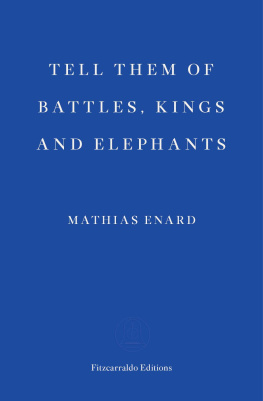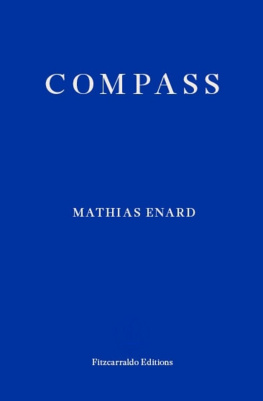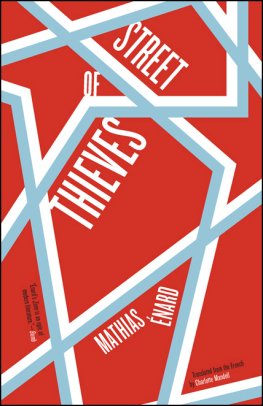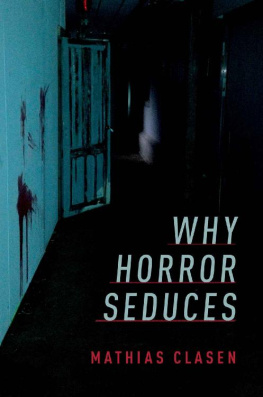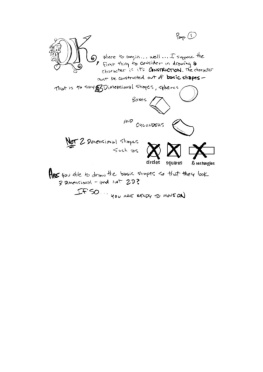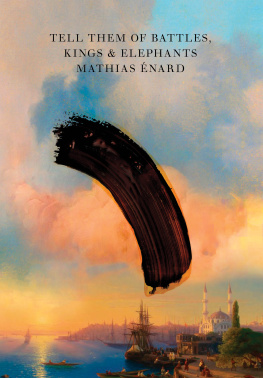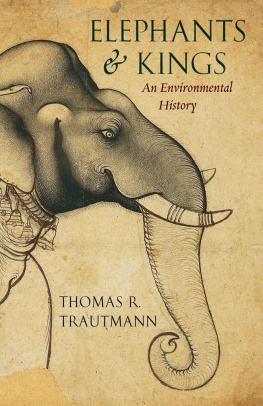Mathias Enard - Tell Them of Battles, Kings and Elephants
Here you can read online Mathias Enard - Tell Them of Battles, Kings and Elephants full text of the book (entire story) in english for free. Download pdf and epub, get meaning, cover and reviews about this ebook. year: 2018, publisher: Fitzcarraldo Editions, genre: Detective and thriller. Description of the work, (preface) as well as reviews are available. Best literature library LitArk.com created for fans of good reading and offers a wide selection of genres:
Romance novel
Science fiction
Adventure
Detective
Science
History
Home and family
Prose
Art
Politics
Computer
Non-fiction
Religion
Business
Children
Humor
Choose a favorite category and find really read worthwhile books. Enjoy immersion in the world of imagination, feel the emotions of the characters or learn something new for yourself, make an fascinating discovery.
- Book:Tell Them of Battles, Kings and Elephants
- Author:
- Publisher:Fitzcarraldo Editions
- Genre:
- Year:2018
- Rating:5 / 5
- Favourites:Add to favourites
- Your mark:
- 100
- 1
- 2
- 3
- 4
- 5
Tell Them of Battles, Kings and Elephants: summary, description and annotation
We offer to read an annotation, description, summary or preface (depends on what the author of the book "Tell Them of Battles, Kings and Elephants" wrote himself). If you haven't found the necessary information about the book — write in the comments, we will try to find it.
Tell Them of Battles, Kings and Elephants — read online for free the complete book (whole text) full work
Below is the text of the book, divided by pages. System saving the place of the last page read, allows you to conveniently read the book "Tell Them of Battles, Kings and Elephants" online for free, without having to search again every time where you left off. Put a bookmark, and you can go to the page where you finished reading at any time.
Font size:
Interval:
Bookmark:
A novelist like Enard feels particularly necessary right now, though to say this may actually be to undersell his work. He is not a polemicist but an artist, one whose novels will always have something to say to us.
Christopher Beha, Harpers Magazine
The most brazenly lapel-grabbing French writer since Michel Houellebecq.
Leo Robson, New Statesman
All of Enards books share the hope of transposing prose into the empyrean of pure sound, where words can never correspond to stable meanings. Hes the composer of a discomposing age.
Joshua Cohen, New York Times
The French novelist Mathias Enard is an unusual kind of regionalist. His great subject isnt a small town or neighbourhood but the vast Mediterranean basin, and practically everyone within it. Enard speaks Persian and Arabic, and he has taught at universities throughout Europe and the Middle East. He sees the Mediterranean as a distinct literary and historical region, a zone, as he called it in his novel of the same title. In nine books, three of which have been translated into English, he has charted a course through this zone, writing about sectarian violence in the Balkans; the varying tugs of jihadism, tradition, and globalization in Morocco; and a rogues gallery of thieves, killers, and eccentrics. Enards prose, which tends to pile descriptive clauses ever higher on top of one another (Zone is a single, five-hundred-page sentence), can be mesmerizing. But its the larger project of his writing that bears particular consideration: in his fiction, Enard is constructing an intricate, history-rich vision of a persistently misunderstood part of the world.
Jacob Silverman, New Yorker
Few works of contemporary fiction will yield as much pleasure as Compass. Reading it amounts to wandering into a library arranged in the form of an exotic sweet shop, full of tempting fragments of stories guaranteed leaving you wanting more.
Eileen Battersby, Irish Times
Enard has written a masterful novel that speaks to our current, confused moment in history by highlighting the manifold, vital contributions of Islamic and other Middle Eastern cultures to the European canon. More than that, it points toward, as one character puts it, a new vision that includes the other in the self.
Andrew Ervin, Washington Post
One of the finest European novels in recent memory.
Adrian Nathan West, Literary Review
Compass is a book about boundaries and non-boundaries, smudged lines between countries, languages, cultures and times. Following this multi-directional flow is a pleasure, thanks in part to prose that translated by Charlotte Mandell buoys academic detours with aphorisms and scenes plush with emotional detail. It is a book with ideas, but one that underpins its eruditeness with a sad, lovesick soul. For a novel overspilling with dead writers, Enard has created a story full of life, full of possibility for the oriental and occidental to find the self in the other.
Thomas McMullan, minor literature[s]
Compass, in its relentlessly discursive impressiveness, embodies an uncompromising vision of the novel as relatively static political and cultural essay.
Steven Poole, Guardian
This is what the great contemporary French novel should be. Enard looks at the world as it is: poisoned by religion, poisoned by politics, choking on materialism and dying of globalization. His prose bites, and his characters retain our sympathy however extreme their actions. Enard fuses the traditions of Cline and Camus, but he is his own man.
Patrick McGuinness, author of The Last Hundred Days
Street of Thieves is a feat of the imagination propelled by deep cultural familiarity and experience, an extraordinary animation of another person Ill read everything Enard writes from now on.
Lee Klein, 3:AM Magazine
Enards novel is to be seen within a tradition of French avant-garde writing The result is a modern masterpiece.
David Collard, Times Literary Supplement
The brilliance of Zone lies in its brutal refusal to stop. Again and again, Mathias Enards white-knuckle narrative plunges us back into the battle-scarred past, forcing us to confront its horrors a relentlessly inventive novel.
David Winters, Literary Review
[T]he material of a conventional thriller has been sublimated into an atmosphere of violence, power and cruelty; humanity here is little more than a vector through which various kinds of insanity flow.
Nicholas Lezard, Guardian
Tell them of what thou alone hast seen, then what thou hast heard, and since they be children tell them of battles and kings, horses, devils, elephants, and angels, but omit not to tell them of love and suchlike.
Lifes Handicap by Rudyard Kipling
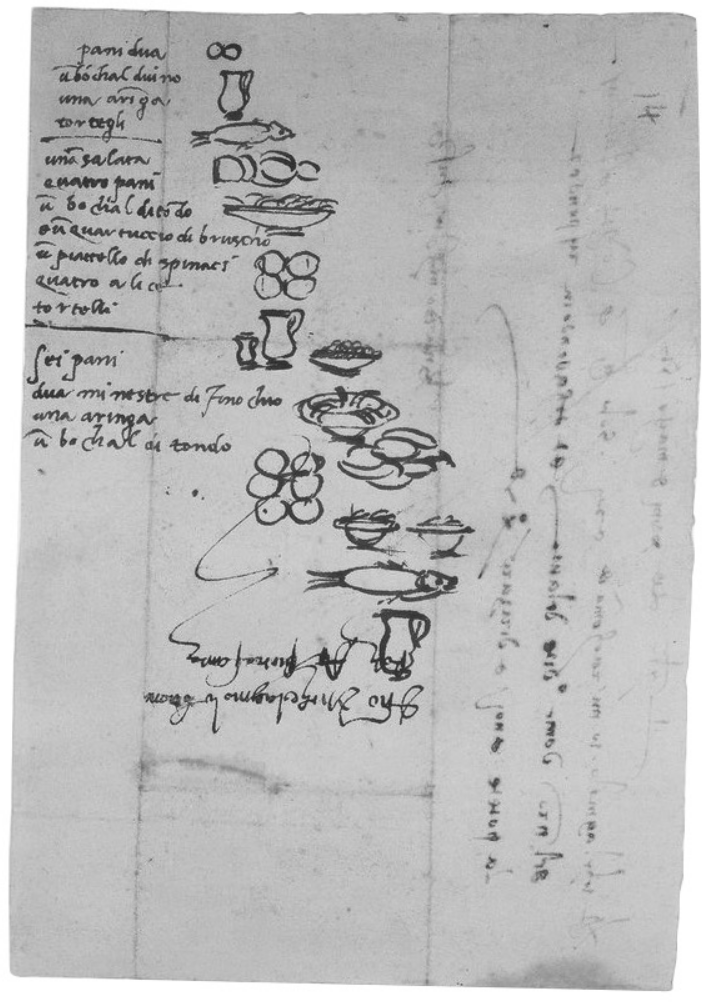
Night does not communicate with the day. It burns up in it. Night is carried to the stake at dawn. And its people along with it the drinkers, the poets, the lovers. We are a people of the banished, of the condemned. I do not know you. I know your Turkish friend; he is one of ours. Little by little he is vanishing from the world, swallowed up by the shadows and their mirages; we are brothers. I dont know what pain or what pleasure propelled him to us, to stardust, maybe opium, maybe wine, maybe love; maybe some obscure wound of the soul deep-hidden in the folds of memory.
You want to join us.
Your fear and confusion propel you into our arms; you want to nestle in there, but your tough body keeps clinging to its certainties; it pushes desire away, refuses to surrender.
I dont blame you.
You live in another prison, a world of strength and bravery where you think you can be carried aloft in triumph; you think you can win the goodwill of the powerful, you seek glory and wealth. But when night falls, you tremble. You dont drink, for you are afraid; you know that the burning sensation of alcohol plunges you into weakness, into an irresistible need to find caresses, a vanished tenderness, the lost world of childhood, gratification, the need to find peace when faced with the glistering uncertainty of darkness.
You think you desire my beauty, the softness of my skin, the brilliance of my smile, the delicacy of my limbs, the crimson of my lips, but actually, what you want without realizing it is for your fears to disappear, for healing, union, return, oblivion. This power inside you devours you in solitude.
So you suffer, lost in an infinite twilight, one foot in day and the other in night.
Three bundles of sable and mink fur, one hundred and twelve panni of wool, nine rolls of Bergamo satin, the same quantity of gilt Florentine velvet, five barrels of saltpetre, two crates of mirrors and one little jewellery box: that is the list of things that disembark with Michelangelo Buonarroti in the port of Constantinople on Thursday, 13 May 1506. Almost as soon as the frigate moors, the sculptor leaps ashore. He sways a little after six days of difficult sailing. No one knows the name of the Greek dragoman waiting for him, so well call him Manuel; we do, however, know the name of the merchant accompanying him: Giovanni di Francesco Maringhi, a Florentine who has been living in Istanbul for five years now. The merchandise belongs to him. He is a friendly man, happy to meet this hero of the republic of Florence, the sculptor of David.
Of course Istanbul was very different then; it was known as Constantinople; Hagia Sophia sat enthroned alone without the Blue Mosque, the east bank of the Bosphorus was bare, the great bazaar was not yet that immense spider-web where tourists from all over the world lose themselves so they can be devoured. The Empire was no longer Roman and not really the Empire; the city swayed between Ottomans, Greeks, Jews and Latins; the Sultan was named Bayezid the second, nicknamed the Holy, the Pious, the Just. The Florentines and Venetians called him Bajazeto, the French Bajazet. He was a wise, tactful man who reigned for thirty-one years; he loved wine, poetry and music; he didnt turn his nose up at either men or women; he appreciated the arts and sciences, astronomy, architecture, the pleasures of war, swift horses and sharp weapons. It is not known why he invited Michelangelo Buonarroti of the Buonarrotis of Florence to Istanbul, though certainly the sculptor was already enjoying great renown in Italy. Some saw him at the age of thirty-one as the greatest artist of the time. He was often compared to the immense Leonardo da Vinci, twenty years his senior.
Font size:
Interval:
Bookmark:
Similar books «Tell Them of Battles, Kings and Elephants»
Look at similar books to Tell Them of Battles, Kings and Elephants. We have selected literature similar in name and meaning in the hope of providing readers with more options to find new, interesting, not yet read works.
Discussion, reviews of the book Tell Them of Battles, Kings and Elephants and just readers' own opinions. Leave your comments, write what you think about the work, its meaning or the main characters. Specify what exactly you liked and what you didn't like, and why you think so.

